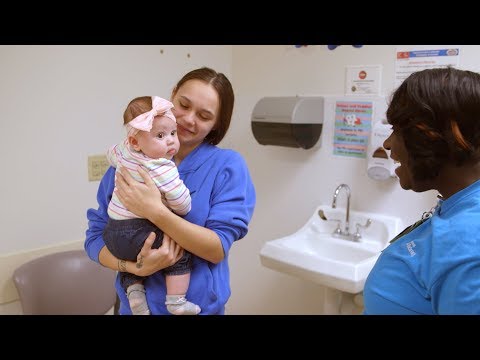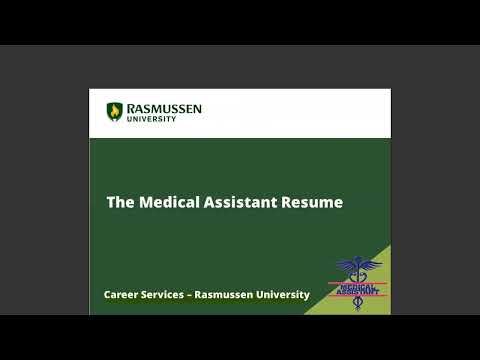The Benefits of a Pediatric Medical Assistant
Contents
- What is a pediatric medical assistant?
- The benefits of a pediatric medical assistant.
- The duties of a pediatric medical assistant.
- The educational requirements of a pediatric medical assistant.
- The skills required of a pediatric medical assistant.
- The job outlook for a pediatric medical assistant.
- The salary of a pediatric medical assistant.
- The working hours of a pediatric medical assistant.
- The work environment of a pediatric medical assistant.
- The career path of a pediatric medical assistant.
If you’re considering a career in healthcare, you may be wondering what the benefits are of becoming a pediatric medical assistant In this blog post, we’ll explore some of the key advantages of this career path.
Checkout this video:
What is a pediatric medical assistant?
A pediatric medical assistant is a medical assistant who specializes in working with children. They are usually responsible for a variety of tasks, such as taking medical histories, checking vitals, administering injections and vaccinations, and assisting the physician with examinations. They may also perform administrative tasks, such as scheduling appointments and handling insurance paperwork.
Pediatric Medical assistants typically have a high school diploma or equivalent, although some jobs may require postsecondary education or certification. Many Medical Assistants receive on-the-job training, which can last up to a year.
The benefits of becoming a pediatric medical assistant include the ability to work with children in a healthcare setting, the opportunity to make a difference in the lives of young patients, and the potential for career advancement.
The benefits of a pediatric medical assistant.
There are many benefits to working as a pediatric medical assistant. One of the biggest advantages is the ability to work with children on a daily basis. This can be a very rewarding experience, both personally and professionally.
In addition to the personal satisfaction that comes from helping children, pediatric medical assistants also enjoy a number of other benefits. These include:
-Competitive pay: Pediatric medical assistants earn slightly more than traditional medical assistants, on average.
-Flexible hours: Many pediatric medical assistants work part-time or full-time hours that fit around their personal schedules.
-Generous benefits: Many employers offer pediatric medical assistants generous benefits packages that include health insurance and retirement savings plans.
-Opportunities for advancement: Pediatric medical assistants who wish to further their careers can often find positions as medical office managers or clinic directors.
The duties of a pediatric medical assistant.
The duties of a pediatric medical assistant are to provide direct patient care under the supervision of a licensed health care provider. They also perform administrative and clinical tasks in support of the health care team. The scope of their practice is determined by their education, training, and experience; state laws; and the policies of the health care facility in which they work.
Pediatric medical assistants work in a variety of settings, including pediatricians’ offices, clinics, hospitals, and other health care facilities. They may be responsible for tasks such as taking medical histories and recording vital signs; preparing patients for examination; assisting with procedures; giving immunizations; and providing patient education.
The educational requirements of a pediatric medical assistant.
Most people think that a medical assistant is someone who helps the doctor with paperwork or perhaps someone who schedules appointments. In reality, a medical assistant does both of those things, but they also do much more. A medical assistant is an important part of the medical team, working closely with both patients and doctors to ensure that everyone receives the best possible care.
A pediatric medical assistant is a medical assistant who works specifically with children. This could mean working in a private pediatrician’s office, in a hospital, or in a clinic that specializes in pediatrics. No matter where they work, however, pediatric medical assistants have one goal: to provide excellent care for their young patients.
Providing excellent care for young patients requires more than just a love of children. It also requires specialized knowledge and skills. That’s why pediatric medical assistants must complete an accredited education program that includes both classroom and clinical instruction.
Most programs take about two years to complete, although some may be as short as one year and some may be longer. Upon completing their education, pediatric medical assistants must then pass a national certification exam before they can begin working with patients.
Once they are certified, pediatric medical assistants are prepared to take on a variety of tasks, including greeting patients and families, collecting patient histories and vital statistics, recording patient observations during examinations, assisting with procedures, providing instruction to parents and caregivers, and much more. In addition to their clinical duties, they also often handle administrative tasks such as scheduling appointments and maintaining patient records.
The educational requirements of a pediatric medical assistant may seem daunting at first glance, but the truth is that most people who choose this career path find it to be both rewarding and fulfilling. If you have a passion for working with children and helping them receive the best possible care, then a career as a pediatric medical assistant may be the perfect fit for you!
The skills required of a pediatric medical assistant.
Pediatric medical assistants perform a variety of tasks in order to help care for sick or injured children. They must be able to take vital signs, measure height and weight, administer medication, prepare patients for examination, and perform basic laboratory tests. In addition, medical assistants must be able to work well with children and their families.
A pediatric medical assistant must have excellent communication skills and be able to work well under pressure. They must also have the ability to multitask and be detail oriented. In order to become a pediatric medical assistant, one must first complete a accredited medical assisting program.
The job outlook for a pediatric medical assistant.
The job outlook for pediatric medical assistants is very positive. Employment of medical assistants is projected to grow 19 percent from 2019 to 2029, much faster than the average for all occupations. The growth of the aging baby-boom generation will continue to drive demand for preventive medical services, which are often provided by medical assistants. As physicians expand their practices to include more outpatient services, they will hire more medical assistants to perform routine administrative and clinical duties, allowing the physicians to see more patients.
The salary of a pediatric medical assistant.
The average salary for a pediatric medical assistant is $32,000 per year. This is a great career choice for those who want to work with children in a medical setting. pediatric medical assistants typically work in doctor’s offices, clinics, and hospitals. They perform a variety of tasks, such as taking patient histories, measuring vital signs, and giving immunizations.
The working hours of a pediatric medical assistant.
The working hours of a pediatric medical assistant are typically very flexible. They generally work Monday through Friday, but may also work weekends and holidays depending on the needs of their patients. Some pediatric medical assistants may even work overnight shifts if their patients require around-the-clock care.
The work environment of a pediatric medical assistant.
A pediatric medical assistant typically works in a clinic or doctor’s office that specializes in pediatrics, which is the branch of medicine dealing with the care of infants, children, and adolescents. The work environment is usually fast-paced and can be stressful at times, since sick children often need urgent care. However, most pediatric medical assistants report that they find their work to be both challenging and rewarding.
The career path of a pediatric medical assistant.
A pediatric medical assistant is a medical professional who works with children, from newborns to teenagers. They work in hospitals, clinics, and doctor’s offices, providing assistance to doctors and other medical staff. They may also work in schools or daycare centers.
The duties of a pediatric medical assistant vary depending on their employer and their specific job role. However, some common duties include taking patients’ vital signs, updating medical records scheduling appointments, giving immunizations, and performing minor medical procedures. They may also provide support to parents and guardians by answering questions and providing information on how to care for a sick child.
Pediatric medical assistants typically need to have at least a high school diploma or equivalent. Many employers also prefer candidates who have completed an accredited program for medical assistants. Some states require certification for medical assistants who work in hospitals or other health care facilities.Pediatric medical assistants can find job opportunities in a variety of settings, including hospitals, clinics, doctor’s offices, schools, and daycare centers. Many pediatric medical assistants work full time, although some may work part time or on a flexible schedule.







